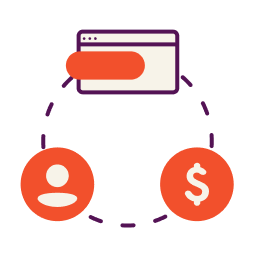How Smart Business Owners Use Credit Cards
Smart business owners can use credit cards to their advantage, whether it’s to amass valuable rewards or to access funds to take advantage of a potentially lucrative opportunity.
Peruse the questions below from business owners like yourself to learn more.
What Is Required to Get a Business Credit Card?
Business credit card issuers usually are most interested in the owner’s personal credit scores, income and credit qualifications. Nav can help you understand which cards you are most likely to qualify for. It uses a proprietary algorithm to help you understand your likelihood of qualifying for specific cards before you apply, so there’s no impact to your credit.
How Do Business Credit Cards Impact My Personal Credit Scores?
Most issuers don’t report business credit card activity to the owner’s personal credit cards unless they default. (This chart shows how major credit card issuers report to personal credit.) However, since issuers check the owner’s personal credit reports when evaluating these applications, there will be an inquiry on one of the owner’s personal credit reports. Inquiries shave just a few points off credit scores, and after a year they generally don’t count.
Can a New Startup Qualify?
Generally, you can get a business credit card as soon as your business is established, as long as you meet the issuer’s credit and income requirements. Again, most issuers will look at the owner’s personal credit qualifications when evaluating an application.
Does My Business Have to Have a Certain Amount of Revenue to Qualify?
Typically, no, as long as your personal income is sufficient to qualify. And if you aren’t drawing a paycheck in your business, you may use income that’s available to you to pay the debt, such as a spouse or partner’s income.
How Can I Get Higher Limits?
Issuers are often eager to extend higher credit limits to customers who qualify and may consider your request in as little as six months after you get the card. When you request a larger credit line the issuer may review your past activity on the account to create an internal score.
For example, they may look at factors such as: How much do you charge? Do you pay on time? Do you always carry a balance or do you sometimes pay the card off? They may request updated information about your income as well. Keep in mind that issuers may review your credit and that may create a hard inquiry.
Should I Spread Expenses Over Several Cards or Use One to the Max?
There can be a number of advantages to spreading your purchases over several credit cards.
The first is that you’ll keep accounts active, so your issuers are less likely to close the account. (Tuck a credit card in the back of the drawer and your issuer may decide to close the account for lack of activity.) Even a small regular purchase on a card may be enough to keep your account open.
Next, you may be able to maximize rewards. For example, let’s say you have one card that earns 3x points for purchases in a certain category, such as office supplies, so you use that card for all purchases you make at office supply stores. You have another card that earns a higher level of cash-back rewards at gas stations so you use that card when fueling up. And perhaps you have a cobranded airline card that gets you free checked bags when you fly, so you use that card for travel. By using multiple cards, you are able to make the most of your rewards.
Finally, your credit scores are less likely to get penalized for high debt usage. High balances in comparison to credit limits can hurt your scores. If you “max out” a card, your scores are likely to suffer. Business credit scores tend to be more forgiving for this factor than personal scores.
However, if you do use multiple cards, make sure you set up a system to track due dates so you don’t accidentally pay late.
Is It a Good Idea to Use Credit Cards to Establish Business Credit and Should You Pay the Balance When the Statement Comes?
Yes, business credit cards can often help establish business credit. Most issuers report these cards to at least one commercial credit reporting agencies, so they can provide a valuable credit reference, provided they are paid on time.
Paying the balance early can help you avoid running up debt and can help reduce the balance reported to the credit reporting agencies, since most issuers report balances around the statement closing date.
Are Interest Rates the Most Important Thing to Look at With Credit Cards and, If Not, What Things Are More Important Than Rates?
If you carry balances, or plan to, then interest rates will be important to you. But if you pay your card in full, then the annual fee and the rewards you’ll earn will be more important.
Should Business Credit Cards Be Used for Emergencies Only?
Credit cards are the safest way to pay for your business purchases; you are protected from fraudulent use. Plus you can earn valuable rewards. As long as you don’t run up debt you can’t pay back, they are a great way to pay for all your purchases. Business owners who are nervous about going into debt may want to consider a charge card instead. You’ll get the fraud protection of a credit card, but your balance is due in full.
How Do You Get a Line of Credit With Your Credit Card?
A credit card offers a revolving line of credit, meaning you can pay the balance in full or over a period of time, and when you pay it down you can charge again. If you’re looking for larger lines of credit, though, you may need to consider getting multiple cards. This is known as “credit card stacking,” which is a method some entrepreneurs use to access larger amounts of credit when they need it.
This article was originally written on August 15, 2016 and updated on November 15, 2023.



Have at it! We'd love to hear from you and encourage a lively discussion among our users. Please help us keep our site clean and protect yourself. Refrain from posting overtly promotional content, and avoid disclosing personal information such as bank account or phone numbers.
Reviews Disclosure: The responses below are not provided or commissioned by the credit card, financing and service companies that appear on this site. Responses have not been reviewed, approved or otherwise endorsed by the credit card, financing and service companies and it is not their responsibility to ensure all posts and/or questions are answered.